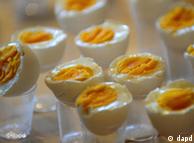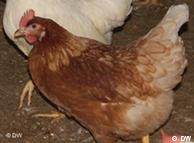07.01.2011
Tests show contamination 77 times safe level in dioxin scandal
Up to 77 times accepted levels of the toxic chemical dioxin were present in samples taken at the firm at the center of the scandal over contaminated animal feed.
Investigators have collected over 100 samples at the company Harles and Jentzsch in the northern German state of Schleswig-Holstein, where fats for animal feed were produced.
Of the 30 samples so far examined, 10 showed excessive levels of dioxin, at between 0.66 and 58.17 nanograms. That is up to 77 times the legal limit of 0.75 nanograms.
Only 12 of the samples contained levels of dioxin below the accepted levels. Nearly 90 samples are yet to be examined. Results of those tests will be released in the coming days.
On Friday, a state official said that Harles and Jentzsch was aware of elevated levels of dioxin in its fat as early as March 2010, eight months earlier than previously thought.
A spokesman for the German Agriculture Ministry said the company detected higher-than-permitted levels of dioxin in its fat with its own tests last year.
The ministry said Harles and Jentzsch should have immediately reported the levels to state regulators, and that the fat should never have been sold.
Tougher EU regulation
 Aigner called for tougher EU rules for animal feedMeanwhile the number of farms preemptively closed because of the dioxin scare more than quadrupled to 4,709 by Friday. The Agriculture Ministry said the closures were a precaution until it could be determined whether they are free from dioxin contamination.
Aigner called for tougher EU rules for animal feedMeanwhile the number of farms preemptively closed because of the dioxin scare more than quadrupled to 4,709 by Friday. The Agriculture Ministry said the closures were a precaution until it could be determined whether they are free from dioxin contamination.Nearly all of the farm closures were pig farms in the northwestern state of Lower Saxony.
Late on Thursday, German Agricultural Minister Ilse Aigner called for stricter, EU-wide regulation on animal feed to better protect consumers and farmers.
She said she also spoke with European Union Health Commissioner John Dalli on the telephone.
"In the coming weeks, I will explore with our EU partners and stakeholders ways to further strengthen our monitoring processes of dioxin in feed," Dalli said in a statement after the conversation.
Eggs spread beyond Germany
The scare began when Harles and Jentzsch allegedly supplied up to 3,000 tons of contaminated fatty acids - which are only meant for industrial use - to animal feed makers.
The feed was delivered mostly to pig and poultry farms, and eggs from some of the suspect farms were exported to the Netherlands. As a result, around 8,000 chickens from German farms were culled.
 Eggs from suspected farms made it as far as BritainEarlier on Thursday it was revealed that some of the suspected eggs made it to the United Kingdom. European Commission health spokesman Frederic Vincent said in Brussels that it was still unclear if those eggs contained dioxin.
Eggs from suspected farms made it as far as BritainEarlier on Thursday it was revealed that some of the suspected eggs made it to the United Kingdom. European Commission health spokesman Frederic Vincent said in Brussels that it was still unclear if those eggs contained dioxin.However tests of other eggs from suspected farms were found to contain up to five times the EU's limit for dioxin.
Dioxin is a by-product of burning rubbish and other industrial processes. It can cause health problems in humans, including cancer, and miscarriages.
Authors: Andrew Bowen, Matt Zuvela, Jo Impey (AFP, Reuters, dpa)
Editor: Rob Turner
Editor: Rob Turner

Keine Kommentare:
Kommentar veröffentlichen